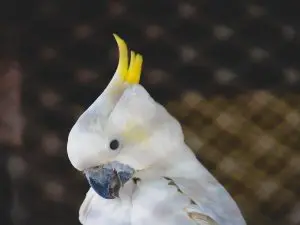
Birds knock into a lot of things, these animals will knock into windows, walls, ceiling fans, and glass screens. The bird will either injure itself or simply fly away after hitting its head.
So, should you be worried if your bird hits its head? This article looks into it.
Table of Contents
My bird hit his head:
Risks:
Nothing at all:
If you’re lucky, and if the bird did not hit its head too hard, then the bird will carry on as though nothing happened.
Concussion:
A concussion is a mild traumatic brain injury that is caused by a blow to the head. Concussions can develop if birds hit their head, but concussions can also develop if birds are mildly shaken.
Concussions can cause temporary cognitive symptoms in humans as well as in birds. Thankfully, humans and birds can quickly recover from concussions.
Cerebral hemorrhaging:
Cerebral hemorrhaging happens when the head experiences trauma and blood vessels rupture. The rupturing of blood vessels causes bleeding inside the bird’s brain.
Other injuries:
If a bird hits its head and develops a brain or spinal cord injury, then the bird may develop dangerous swelling. If this swelling is not attended to as soon as possible this can be very dangerous. Seizures can also happen if the bird hit its head.
When to worry:
If a bird knocks into something, and immediately gets back up and acts normally afterward then you have nothing to worry about.
However, there are some telltale signs that indicate that a bird has a concussion and that you should be worried, these signs are:
- Aloofness
- Wing droop
- Regurgitation
- Unconsciousness
- Falling off perch/inability to perch
- Convulsions
- Excessive sleepiness
- Little energy
- Loss of appetite
- Uncoordinated flight
What to do about it:
Take your bird to the vet:
If you can, take your bird to a vet if they are open, or, take your bird to an emergency vet if you get the chance. Taking your bird to a vet is recommended because the vet can immediately treat your bird using medication or surgery.
Before you take the bird to the vet:
You’d need to stabilize the bird before traveling to take it to the vet.
Start off by gently picking the bird up making sure that it is kept in a horizontal position, support the bird’s head as you pick it up, doing this prevents further damage.
The bird may bite you out of pain when you do this, but keeping the bird in this position is necessary.
Make sure that you do not place the bird on its back, doing this will kill the bird. Laying the bird on its back will cause the bird’s blood pressure to drop and this will kill the bird.
Examine the bird visually for any bleeding or bones protruding. Gently check the bird’s breast bone, wings, and legs for any injuries.
If the bird is bleeding, use some cornflour, or any other flour, on the bleeding area. Do not use the flour on the bird’s beak or on its respiratory areas
If you can’t immediately take your bird to the vet, keep the bird awake for 30 minutes to 1 hour after their regular bedtime to make sure that the bird is acting as normally.
Keeping the bird, or the bird and its cage, in a quiet dark room is recommended.
If you decide to place the bird’s cage in a dark room then you’d need to lower the bird’s perches and pad the bottom of the cage, this gives the bird a soft spot to land on if it gets off balance and falls.
Warning: Avoid keeping the bird too warm, keeping the bird too warm will make the internal swelling worse and will make the pain worse as well. Don’t allow the bird to get cold either, keeping the bird at room temperature is fine.
On your way to the vet:
Make sure that the bird’s temperature does not drop as you’re on the way to the vet, keep the bird at a normal temperature.
Maintaining the bird’s body temperature at normal levels is necessary because it is very difficult to bring a bird’s core body temperature back up after it’s cooled down too much.
Also, make sure that you talk to the bird as you travel, the sound of your voice will keep it fighting for its life.
If you enjoyed this article then you may also be interested in other bird related articles. Here are some articles that you may be interested in: Apple Cider Vinegar For Budgies, Natural Antibiotics For Budgies, Signs Of Head Trauma In Birds, Pain Relief For Birds

